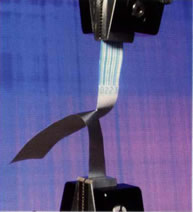
For over 35 years, Mecmesin has been providing medical device manufacturers with force and torque testing solutions to ensure quality control of materials, components, packaging and finished products. Medical devices, often safety-critical, have to meet the highest quality standards and conform to stringent regulations. With ever-increasing demand to drive down mass production costs and frequent introduction of new safety-oriented devices, it is essential that medical device manufacturers ensure quality throughout the design and manufacturing process.
Mecmesin force and torque testing systems enable manufacturers to test in accordance with national and international technical standards, such as ASTM, BS, ISO, and DIN standards and in-house specifications, thus providing a vital ingredient in the successful design and production of medical devices. Mecmesin provides force and torque testing solutions for a wide variety of medical applications, from standard products like bandages and surgical gloves, to complex medical devices for inhaled drug delivery, anesthesia and patient monitoring, plus medical packaging and packaging materials.
For example, medical and surgical tubing is widely used in medical procedures, from stents and catheters through to supplying oxygen to intensive care patients. The mechanical performance of tubing is therefore critical to ensure patient safety. Tensile tests are performed to measure the strength of the tubing and connector pull-off tests, to ensure that when used the tubing will not become disconnected from the device. Needles and syringes must perform precisely to specification during injection or aspiration, to ensure patient comfort and safety.
Needle insertion and extraction forces are measured in development and production, to characterize point sharpness, the frictional forces along the shaft and the effectiveness of the beveled tip geometry. Tensile testing is used to test needle-to-hub retention strength and the strength of crimps that connect surgical needles to sutures. Three-point bend tests are used to assess the stiffness of needles and the likelihood of permanent deformation on insertion.
Needle hubs attach to syringes via Luer lock connectors. Torque testing is used to ensure that the joint between the Luer lock and the needle is strong enough, while remaining easy to operate. Compression tests are used to syringes, to ensure that the forces necessary to move the plunger and eject fluid from the barrel are not too high or too low, ensuring smooth and effective delivery of drugs to the patient. Electronic medical devices, such as insulin pumps and patient monitors, are playing an increasingly important role in virtually every aspect of modern medicine, and the growth in the sophistication of these devices continues unabated. At the design stage, force and torque testing is used to measure the actuation force/torque and tactile feedback of rotary controls. During the manufacturing process, force testing is used to assess safety and performance-critical parameters, such as component-to-PCB joint strength assessment and the retention force of push-pill electrical and fiber-optic connectors.
Many new and innovative medical devices are now available over-the-counter to patients, such as asthma inhalers and pen-injectors. Force and torque tests, such as the removal strength and twist-off performance of inhaler caps, allow an objective evaluation of whether such devices can be easily and safely used by patients, ranging from young children through to the elderly, whose hands may be affected by arthritis. Force testing is also used to assess the physical attributes of surgical implants. For example, fatigue testing and failure analysis of orthopaedic implants and their resistance to physiological loads, mechanical assessments of the strength of fixtures for implants and quality assessments of cardiac pacemakers. Medical device packaging must ensure devices remains secure, sterile and undamaged during distribution and storage. Typical force and toque testing of packaging applications include: Tensile strength, elongation and tear testing of flexible packaging; peel strength of adhesive seals, co-efficient of friction assessment packaging material and torque testing of closures.
The use of Mecmesin equipment for packaging testing ensures that medical packaging is easy to use, but remains reliable, sterile and secure. In conclusion, using Mecmesin force and torque testing systems enables designers to perfect the usability and fitness-for-purpose of medical devices, while striking the optimum balance between material usage and maximum strength. Force and torque testing is used at the point of production, to quickly and identify and amend production errors that could not only harm a brands reputation, but also jeopardise the safety and comfort of patients and, finally, it is a vital component of a manufacturer’s quality management system, enabling conformance with relevant international and national standards, as well as in-house specifications.